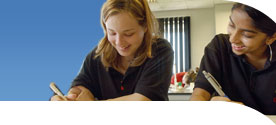



Personal development addresses the social, cultural, intellectual, economic, physical, emotional, moral and spiritual aspects of young people's education. A coherent approach to personal development will help young people grow towards maturity and develop independence and will be reflected in the ethos of the school and what it values.
The curriculum is more than what is taught in individual subjects: it is the entire planned learning experience of learners. It takes place in and out of the classroom and calls for active teaching and learning methods. For pupils to progress, transferability of skills and understanding together with experience of a variety of social and emotional contexts are significant parts of the learning. At its heart is a sense of the individual and the roles each person has to play in life - in a family, as a neighbour, with friends, as an employee and a member of a community.
To help schools plan personal development as part of their curriculum the following table, based on the five outcomes of Every Child Matters, has been devised. It sets out the attitudes, knowledge and abilities that need to be developed as an integral part of the whole curriculum.
The curriculum should help young people:
| Develop the capacity to enjoy life and succeed in it | Young people will:
|
|---|---|
| Learn how to stay safe and manage risks | Young people will:
|
| Understand how to maintain a healthy lifestyle | Young people will understand:
|
| Form relationships and participate in society | Young people will:
|
| Acquire the knowledge, skills and understanding relevant to working life | Young people will be able to:
|
Learning for personal development is a lens through which the curriculum should be viewed.
The whole curriculum promotes learners' attainment and helps prepare them for life but some areas make a more specific contribution to personal development. It is clearly significant in citizenship, PE and RE.
In addition, the areas of personal, social and health education, careers education, enterprise education, work-related learning and financial capability also contribute to learners' personal development.
To support schools in delivering a more coherent curriculum, these areas are to be brought together into a new area of learning called personal, social, health and economic education (PSHEE). At key stages 3 and 4 the existing guidelines and frameworks will be replaced with non-statutory programmes of study in personal well-being (which includes sexual relationships, drugs and alcohol) and economic well-being(which includes careers education, enterprise education, work-related learning and financial capability).
Personal development needs to be in tandem with knowledge and understanding and the development of personal, learning and thinking skills. These can be exploited through the new PSHEE guidance and by giving them explicit attention in teaching and learning in subjects.